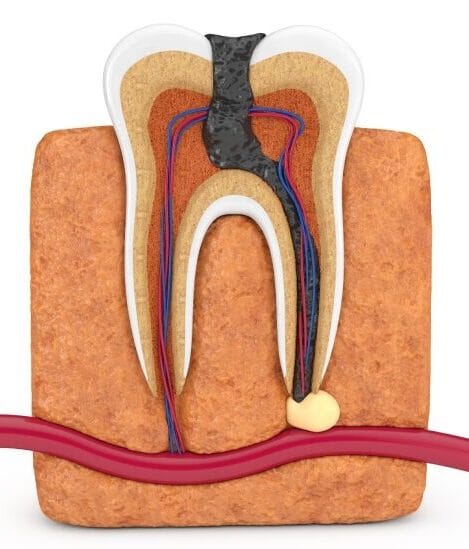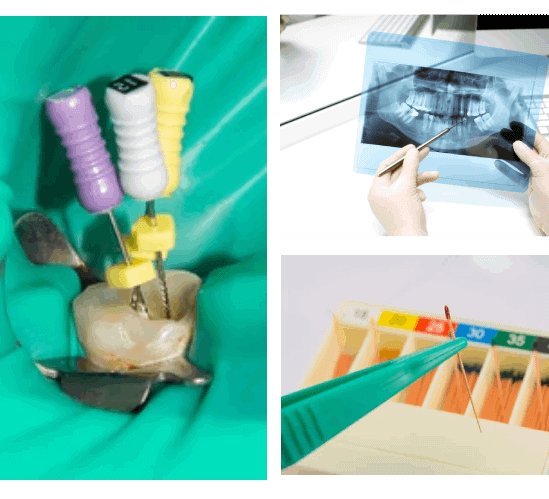Painless Root Canal Treatment in Mira Road
What is Root Canal Treatment?
Root canal treatment is a dental procedure aimed at rescuing a tooth that has severe decay or an infection. The term “root canal” refers to the space inside the tooth’s root, which contains the nerve and blood vessels. When this area becomes infected or damaged, a root canal can help to restore the tooth and relieve pain.
During a root canal, a dentist removes the infected or damaged pulp from inside the tooth. During the process, the dentist carefully cleans and disinfects the tooth before filling it with a special material to seal it and prevent future issues. Finally, the tooth is often covered with a crown to protect it and restore its function. This procedure is a common and effective way to save a tooth that might otherwise need to be extracted.
Benefits of Root Canal Treatment
Root canal treatment offers several benefits, making it a valuable option for dealing with infected or damaged teeth:
Pain Relief: One of the main benefits of a root canal is that it provides significant relief from intense tooth pain. The procedure addresses the source of the pain—usually an infection in the tooth’s pulp providing relief.
Preservation of Natural Teeth: Root canal treatment allows you to keep your natural tooth, which is important for maintaining proper bite alignment and chewing function. Keeping your natural tooth also helps preserve the surrounding teeth and bone structure.
Prevents Infection Spread: By removing the infected pulp and sealing the tooth, a root canal prevents the infection from spreading to other areas of the mouth. This can help avoid more serious complications and additional treatments.
Improves Functionality: After a root canal, the treated tooth can function normally, allowing you to eat and speak without discomfort. With proper care, a tooth that has undergone a root canal can last for many years.
Cost-effective: While root canal treatment may seem costly up front, it is often more affordable in the long run compared to the cost of extracting the tooth and replacing it with a dental implant or bridge.

What Is The Procedure For A Root Canal?
The root canal procedure is designed to treat and save a tooth that has been severely infected or damaged. Here’s an overview of the steps involved:
Diagnosis and Preparation
The dentist starts by diagnosing the issue, usually through X-rays, to determine the extent of the infection and the best course of action. Local anesthesia is administered to numb the affected tooth and ensure a pain-free procedure.
Access Opening
A small opening is drilled into the top of the tooth to access the pulp chamber and root canals. This step allows the dentist to reach the infected tissue inside the tooth.
Cleaning and Shaping
The dentist cleans the infected canal using specialized files, medications, and an Apex Locator for precise depth measurement. After removing the damaged pulp, the canals are shaped and prepared for filling, ensuring thorough treatment.
X-Ray Verification
An X-ray is taken to check that the canals have been thoroughly cleaned. Additionally, computerized X-rays, which have 0.001 percent of the exposure of standard X-rays, are used to verify that the infection has been fully addressed. This step ensures that the treatment has been effective and that the canals are free of infection.
Filling and Sealing
Once the canals are properly cleaned and verified, they are filled with a biocompatible material known as Gutta Percha. This material seals the canals to prevent future infections. After the root canal is completed, the tooth is filled with a composite or miracle mix to restore its structure and function.
Restoration
In most cases, a crown or other type of restoration is placed over the treated tooth to provide additional protection and restore its full functionality. This final step helps ensure that the tooth can continue to serve its purpose for years to come.
Is It Possible Without Pain?
One common concern about root canal treatment is whether it will be painful. The good news is that modern root canal procedures are typically not painful due to the use of local anesthesia. Here’s what you can expect regarding pain:
Anesthesia: Before the procedure begins, the dentist will administer local anesthesia to numb the affected tooth and surrounding area. This ensures that you won’t feel pain during the treatment.
During the Procedure: Most patients report feeling only slight pressure or discomfort during the procedure, but no significant pain. The anesthesia keeps the area numb, so you should not experience any sharp pain.
Post-Procedure Discomfort: After the anesthesia wears off, some patients may experience mild discomfort or soreness in the treated area. Discomfort following the procedure is typically mild and can be eased with over-the-counter pain medications. Most people find that any soreness fades away within a few days.
Long-Term Pain Relief: The primary goal of a root canal is to relieve the pain caused by an infected tooth. Once the procedure is complete, many patients find significant relief from their previous pain.

Please call 8097869836. Urgent care is provided usually on the same day.
Who Needs Root Canal Treatment?
Root canal treatment is recommended for individuals who have a tooth with damaged or infected pulp. Some common situations that may require a root canal include:
Severe Toothache: Persistent, severe tooth pain that doesn’t go away with over-the-counter painkillers may indicate an infection in the tooth’s pulp, making a root canal necessary.
Deep Decay: When a tooth has a large cavity that extends into the pulp chamber, a root canal may be needed to remove the infected tissue and save the tooth. For alternatives to treat tooth decay, check our Teeth Whitening services.
Repeated Dental Procedures: If a tooth has undergone multiple dental procedures or has a large filling, it may be at risk of pulp damage or infection, requiring a root canal.
Cracked or Broken Tooth: A cracked or broken tooth can expose the pulp to bacteria, leading to infection. A root canal can address the damage and prevent further complications. Consider our Smile Makeover for an aesthetic improvement post-treatment.
Sensitivity to Hot or Cold: Extreme sensitivity to hot or cold temperatures, especially if it lingers after the stimulus is removed, can be a sign of pulp damage or infection, indicating the need for a root canal.
What to Avoid After Root Canal Treatment
After undergoing a root canal, it’s important to follow specific guidelines to ensure proper healing and prevent complications:
Avoid Chewing on the Treated Tooth: For the first few days after the procedure, try to avoid chewing on the tooth that was treated. This helps prevent damage to the tooth before it is fully restored with a crown.
Refrain from Hard or Sticky Foods: Avoid hard or sticky foods that could put stress on the treated tooth and potentially cause it to crack or break. During the initial recovery phase, stick to softer foods to avoid putting stress on the treated tooth.
Practice Good Oral Hygiene: Continue to brush and floss your teeth as usual, paying special attention to the area around the treated tooth. Maintaining good oral hygiene helps prevent further infections and promotes healing.
Avoid Smoking: If you smoke, try to avoid it during the healing period. Avoid smoking as it can slow down your healing process and heighten the risk of complications.
Attend Follow-Up Appointments: Keep all scheduled follow-up appointments with your dentist to ensure that the tooth is healing properly and to have any necessary restorations completed.
By understanding these aspects of root canal treatment, you can make informed decisions about your dental care and maintain your oral health effectively. If you have any concerns or questions about the procedure, consult with your dentist to get personalized advice and support.
Book Your Root Canal Appointment Today
Don’t let tooth pain control your day-to-day life any longer. If you suspect you might need a root canal, reach out to Smiling Teeth Dental Clinic in Mira Road, Mumbai, right away. Our warm and welcoming team is dedicated to helping you reclaim your smile and bid farewell to discomfort. Book an appointment with us today, and let’s work together to make your dental experience as smooth and stress-free as possible. Begin your path to a healthier, pain-free smile with us today.
People also ask
Root canal treatment (endodontics) is a dental procedure used to treat infection at the centre of a tooth. Root canal treatment is not painful and can save a tooth that might otherwise have to be removed completely.
In spite of these occasional complications, root canal therapy remains one of the safest, most successful and most valuable dental procedures available today. Getting the treatment you need will ensure your mouth is healthy and pain-free. Oral Care Center articles are reviewed by an oral health medical professional.9 Jan 2023
While the vast majority of root canals will last at least 5 years, most of them will last up to 10 or 15 years. If you get a crown and maintain impeccable dental hygiene habits, it can last a lifetime.
It’s very similar to a routine filling and can usually be completed in one or two appointments, depending on the condition of your tooth and your personal circumstances. Getting a root canal is relatively painless and extremely effective. You’ll be back to smiling, biting and chewing with ease in no time.
You can eat 30 to 45 minutes after a root canal, which is enough time to allow your temporary filling to fully harden, but it’s generally recommended that patients wait to eat until after the anesthetic has worn off to prevent you from biting your cheek or tongue.
